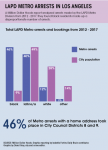An elite division of Los Angeles’ police force arrested a disproportionate number of Black residents from 2012 to 2017, according to a UCLA report.
The report was released by Million Dollar Hoods, a project which analyzes policing and mass incarceration in Los Angeles.
[Related: History, African American studies professor appointed as director of Bunche Center]
The UCLA researchers found that while Black residents comprise just 9% of LA’s city population, they made up 46% of all LAPD Metro arrests and 31% of all LAPD arrests.
LAPD did not respond to requests for comment.
The report found the most common charges against residents were failure to appear in court and possession of controlled substances.
Metro is an elite division of LAPD, created in 1933, that houses the K-9, Mounted Unit and Special Weapons and Tactics. Homeless individuals made up 19% of LAPD Metro arrests.
While LAPD Metro operates in all 15 city council districts, over 46% of arrests with a home address were in City Council Districts 8 and 9, commonly known as South LA.
Isaac Bryan, public policy director of Million Dollar Hoods and public policy advisor of the Ralph J. Bunche Center for African American Studies, said he thinks LAPD Metro has always had a difficult relationship with the South LA community.
“The community often has seen (LAPD Metro) as a hammer,” Bryan said. “What our report shows is that despite having jurisdiction over the whole city, they seem to only be operating in South LA.”
Bryan said the new report was published partly in response to a recent Los Angeles Times article that alleged that LAPD Metro stopped Black motorists at twice the rate of other LAPD officers.
Ricardo Patlan, a co-author of the report and recent UCLA graduate, said the research of Million Dollar Hoods helps community members reinforce their personal experiences with hard data.
“When I went to a community meeting recently, a lot of community members were citing our report when they were talking with the (police) chief,” Patlan said. “They were saying, ‘Hey, this is what we see on the ground and we have these numbers to back our narrative, to support what we’re trying to say.’”
Patlan said he thinks the conclusions of the report question the effectiveness of LA’s approach to reducing crime.
“It begs the question, how do we best work towards reducing crime in LA? Is it increasing policing or is it by diverting resources to community programs or mental health services, (or)
“The Million Dollar Hoods report has been able to give us the tools necessary to be able to advocate for the resources,” Turner said. “It’s not that resources aren’t there, it’s that resources have been directed in ways that harm our communities, not necessarily help our communities.”
[Related: New UCLA study reveals statistics on student policing by LASPD]
Turner said breaking down the costs of incarceration helps community organizations to lay out alternatives to current policing practices. By outlining the current use of public funds, Million Dollar Hoods helps communities demonstrate to public officials the already existing resources that can be redirected to alternatives to mass incarceration and policing problems, Turner said.
Million Dollar Hoods estimated the minimum cost of all LAPD Metro incarcerations was $8,040,953, including $3,722,029 just for the jailing of Black residents.
Patlan said he thinks UCLA students could have a tangible impact on their community.
“Where we are at UCLA, in West LA, we’re not as impacted as South LA, but we’re still a part of the community,” Patlan said. “And as a research institution that has the power and the resources to do this kind of work, it’s very important for students to realize that this is something they can do that makes a difference on the ground.”
